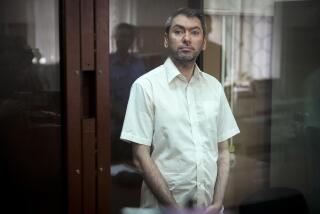‘Very Happy to Finally Be Here’ : Sakharov Met by Kin on His 1st Trip to U.S.
- Share via
BOSTON — Soviet nuclear physicist Andrei D. Sakharov, patron of Soviet dissidents and “father” of the Soviet hydrogen bomb, arrived here Sunday night for his first trip to the United States.
A living symbol of the more liberal glasnost (openness) policies of the Kremlin, Sakharov arrived here under cloudy and wet skies, seven hours late, after a stopover in New York on his long flight from Moscow. He was welcomed by members of his wife’s family, who have lived in nearby Newton, Mass., for nearly 10 years.
Sakharov appeared tired but, as he said, “very happy to finally be here in the United States,” for which he always has had “great respect.”
In brief comments to the press, which were translated by his stepdaughter, Tatiana Yankelevich, he added: “This is a very important event, my very first trip abroad. . . . Two years ago I became a free man when I returned from (internal exile in) Gorky to Moscow, and now I have become even freer, because I have the right to travel around the world.”
Sakharov also noted the sad irony that a man who had demonstrated on his behalf when he was exiled to Gorky is still in jail while Sakharov himself has been freed. Indeed, the man faces more serious charges, Sakharov said, presumably arising from his behavior in prison.
“I feel it is my duty to remember that man now,” he said, identifying the man as Vasil Milanov.
After a few days at his relatives’ home, Sakharov, 67, will be examined at Massachusetts General Hospital for possible implantation of a heart pacemaker before taking part in a program to promote the new Moscow-based International Foundation for the Survival and Development of Humanity.
He will go to Washington next week to receive the $50,000 Albert Einstein Foundation peace prize and be received by President Reagan at the White House.
Sakharov, who won the Nobel Peace Prize in 1975 for his human rights activism, is a clear beneficiary as well as symbol of the reform program of Soviet President Mikhail S. Gorbachev.
He was banished to internal exile in the closed city of Gorky in 1980 because of his outspoken criticism of the Soviet invasion of Afghanistan as well as of other Kremlin policies, notably its curbs on emigration and recognition of minority rights. He was denied permission to travel--even to receive the Nobel Prize--on grounds that he still knew too many secrets about Soviet nuclear weapons programs.
Gorbachev brought him back to Moscow two years ago to “participate” in perestroika (restructuring), which needs the support of scientists and intellectuals to achieve the economic and technological advances Gorbachev has called for.
Wife Remains in Moscow
Now, by allowing Sakharov to travel--although perhaps not without strings, for his wife, Yelena Bonner, remains at home--Gorbachev is showing the West that his policies can have substantive results in freedom of travel.
Since his return from exile, Sakharov has both supported and criticized Gorbachev’s efforts.
He has, for example, sided with Gorbachev in attacking the Reagan Administration’s Strategic Defense Initiative, or “Star Wars.”
Sakharov has also called for release of all political prisoners and advised his fellow Soviet intellectuals against taking the “misguided” attitude of not criticizing Gorbachev.
More to Read
Sign up for Essential California
The most important California stories and recommendations in your inbox every morning.
You may occasionally receive promotional content from the Los Angeles Times.













